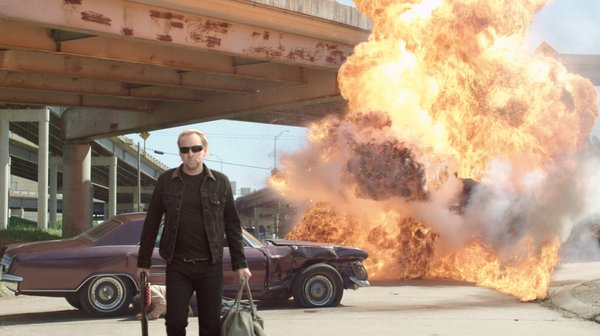On 'Drive Angry,' the Schlocky Role Nicolas Cage Was Born to Play
Drive Angry, now out on DVD, is not a great movie. But it is a great Nicolas Cage movie
That Nicolas Cage is sui generis has long since been established. But even he, through some heroic act of code-breaking or the casting of an ancient spell, can't change the fact that his stock is dropping.
His output in the last decade, from Adaptation to Next, has been of wildly varying quality. After clips culled from Neil LaBute's ill-conceived Wicker Man remake became something of a YouTube sensation, Cage began to personify a certain type of sublimely unpredictable bad movie; then director Werner Herzog recruited the actor for his unhinged, fitfully amusing Bad Lieutenant installment. More recently, if one is to judge by most traditional metrics (reviews, domestic box-office receipts), the returns have diminished precipitously. Connect these dots, and it may seem like a narrative of irrevocable decline has taken shape.
Certainly Cage has begun to repeat himself. It seems that if a project has some whiff of the occult, or requires heedless action sequences, goosed with outlandish CGI—or perhaps, like new home-video release Drive Angry, both—there's been no choice but to call Cage. And on the heels of 2009 reports that he owed millions in back taxes and was suing his former manager, citing "financial ruin," the perception became that he was increasingly eager to sign on whatever dotted line presented itself.
But have the movies actually gotten progressively worse? Drive Angry suggests not, despite its wholesale rejection by the movie-going public. The 3D film opened stateside in late February, and landing in ninth place at the box office, ultimately taking in less than $20 million worldwide. The (typically) withering verdict on Cage from Deadline Hollywood Daily's Nikki Finke: "Time to become a TV actor."
To be sure, Drive Angry is very far from a masterpiece. But watching director Patrick Lussier's exploitation-flick tribute—something along the lines of Quentin Tarantino's Death Proof via Neveldine + Taylor (the filmmakers behind hepped-up boner-joke milestone Crank)—is a more-than-tolerable experience. In the film, Cage portrays Milton, a bad-to-the-bone type who somehow escapes from hell (obvious echoes of Cage vehicle Ghost Rider) to save his granddaughter from the clutches of a satanic cult, led by Southern charlatan Jonah King (Billy Burke). Cage spends a large portion of the movie behind the wheel of a '69 Dodge Charger belonging to a foulmouthed diner waitress (Amber Heard), pursuing King while attempting to elude the police and, more critically, a dapper minion of the devil (William Fichtner).
Cage's manic intensity has always paired well with comic, or comically extreme, violence—and Drive Angry probably has more of it than any of the star's previous films. Milton, presumably named after the poet, engages in a shootout while drinking, smoking, and copulating; wields a super-weapon called "The God Killer"; and drinks beer from an enemy's skull. But perhaps the movie's greatest surprise is Cage's relative restraint. He keeps the baroque tics to a minimum and whispers more than he yells; Milton occasionally evokes the front-seat stoics of Monte Hellman's 1971 landmark Two-Lane Blacktop, only with a lot more one-liners in the tank (he also soulfully rasps about the worst part of hell, the "video feed" that shows the helpless dead footage of still-living loved ones in peril). As the thoroughly devious Accountant, veteran character actor Fichtner turns in a far showier performance, more typically Cage-ian in its volatility.
I am not one of those people who will jump at the chance to watch Nicolas Cage chew whatever scenery he's passing through. If Drive Angry were a career killer, I wouldn't be afraid to say it. But the grindhouse knockoff works on account of the gleeful sincerity of its homage and its almost-bold use of progressively more abstract (and knowingly asinine) special effects—particularly during the climactic battle, when the God Killer lights up the sky with fireworks. Moreover, Drive Angry offers evidence that Cage hasn't recently been one-note in his performances so much as in his choice of schlocky material.
